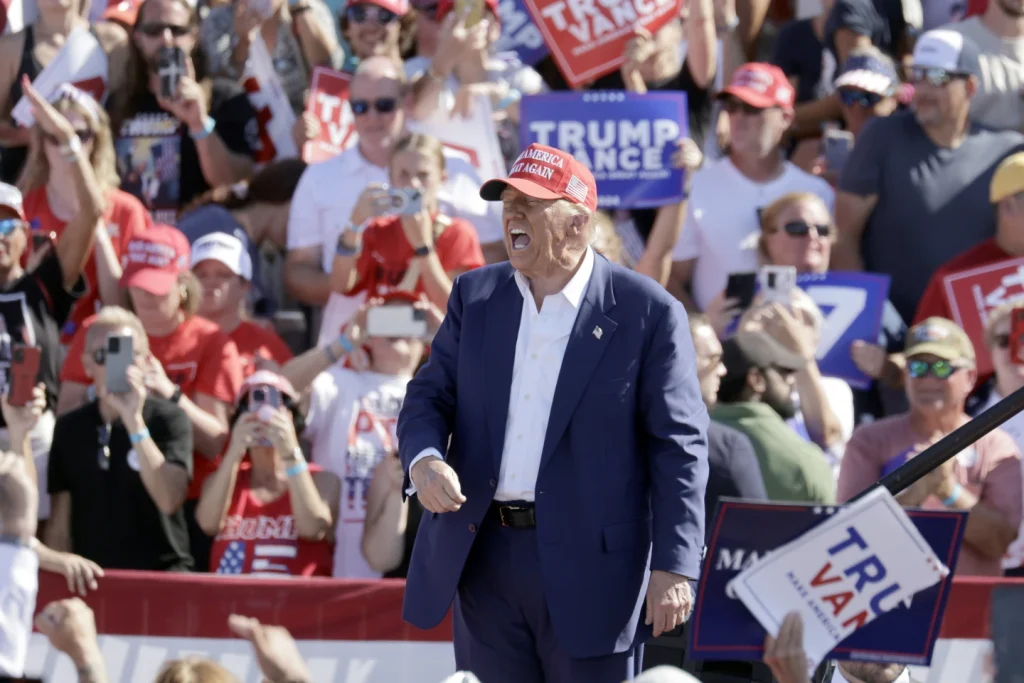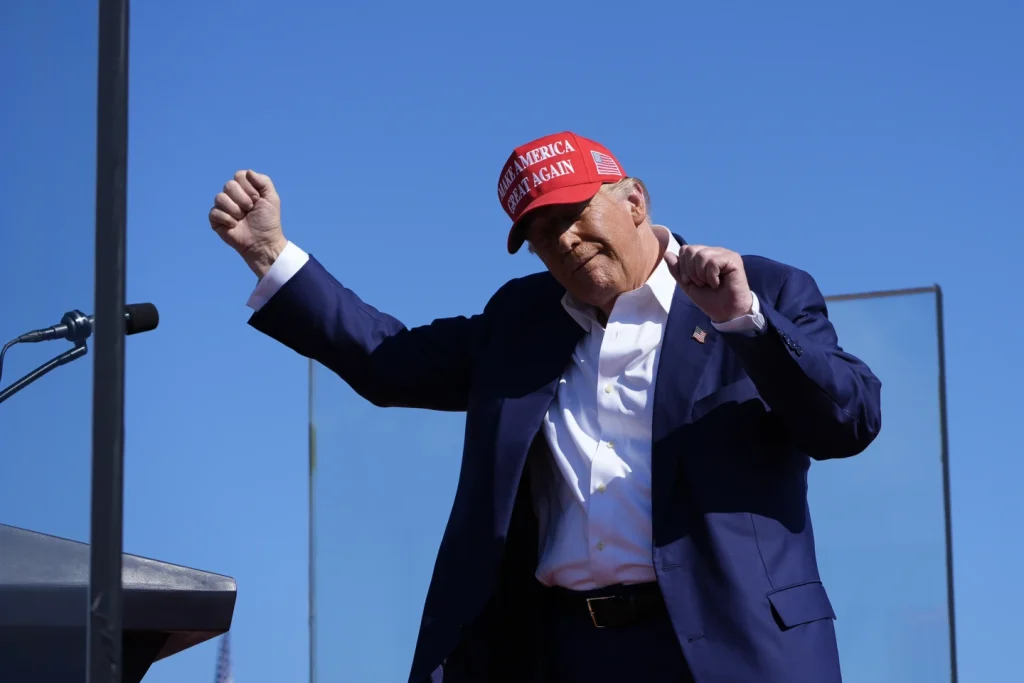Former President Donald Trump made headlines recently with a statement suggesting he might not pursue a candidacy for the White House in 2028, should his efforts to reclaim the presidency in 2024 prove unsuccessful.
When prompted by journalist Sharyl Attkisson during an interview, Trump remarked, “No, I don’t. I think that will be, that will be it.”
This assertion is notable for various reasons, reflecting Trump’s characteristic bravado while simultaneously acknowledging a potential vulnerability that is rarely exhibited by him—a willingness to consider defeat.
To fully comprehend the significance of Trump’s statement, it is essential to contextualize it within his previous rhetoric and strategies.
Throughout his political career, Trump has often portrayed himself as a formidable force, continuously asserting that the only way he could lose would be through electoral fraud.
This narrative was particularly visible during the aftermath of the 2020 presidential election, which he claimed was rife with “widespread cheating.”
His preemptive assertions regarding the integrity of elections seem closely tied to his broader strategy of consolidating support among his base by casting doubt on the legitimacy of political systems that do not favor him.
In this light, Trump’s recent commentary can be interpreted as a significant departure from his traditional narrative. By indicating that he might not run again if unsuccessful in 2024, he seems to acknowledge a potential reality—one where he lacks the electoral support needed to mount a serious campaign for a fourth bid.
This shift raises questions about the psychological complexities and evolving strategies behind Trump’s public persona and campaign, especially as the Republican electorate continues to debate the future direction of the party.
The consideration of Trump’s age is another important aspect. At 82 years old in 2028, Trump would be approaching an age where questions about mental acuity and physical stamina are often magnified in the political arena.
Interestingly, President Joe Biden, currently under scrutiny for his age and perceived health issues, stepped away from the race following a poor debate performance.
Trump’s reference to age does not appear to be a casual observation; it underscores a growing discourse within American society regarding the age of political leaders and their capabilities.
Moreover, Trump’s public acknowledgment of age in the context of presidential politics raises the stakes for not just him but also the broader political landscape.
It invites a discussion about generational change within the Republican Party and the potential emergence of younger candidates who may resonate more strongly with an electorate that increasingly values diversity in age and experience.
During the same interview with Attkisson, Trump defended his administration’s record on the COVID-19 pandemic, crediting himself with the rapid development of vaccines.
This strategic maneuver highlights Trump’s continual effort to reshape public perception around his handling of the crisis, a topic that has been used to critique his administration comprehensively.
By taking credit for vaccine development, he attempts to distance himself from the criticism he faced during the crisis, portraying himself as a proactive leader who responded to an unprecedented national emergency.
Yet, the nuances of this narrative must be examined critically. While Trump’s administration indeed played a role in the expedited development of COVID-19 vaccines through initiative and funding, the broader implications of public health outcomes during his term cannot be ignored.
The disarray and confusion surrounding pandemic response during 2020 contributed significantly to his unfavorable ratings at the time, ultimately leading to his electoral defeat.
His comments now reflect his efforts to reclaim agency over a narrative that has often portrayed him unfavorably.
Looking towards the 2024 election, Trump’s statements also risk impacting his campaign strategy. His admission that he might not seek office again could be interpreted as a signal of either resignation or a calculated move to consolidate his current support without the looming threat of a future campaign hanging over him.
He is, however, also likely aware of the deflated enthusiasm that sometimes accompanies proclamations about the future. In the highly volatile realm of American politics, perceived indecision can be detrimental.
The Republican electorate appears to be in a state of flux, as various potential candidates might already be positioning themselves for a significant challenge, should Trump falter.
Individuals like Florida Governor Ron DeSantis and former Vice President Mike Pence have been active in critiquing the current administration, while also cultivating their electoral bases.
Trump’s comments might inadvertently open the door for others to advance their aspirations by delegitimizing his incumbency as the unequivocal frontrunner.
In a recent interview, former President Donald Trump articulated a notable divergence in public sentiment regarding vaccination within the political landscape, contending that Republican constituents have increasingly adopted a skeptical stance toward vaccines, contrasting sharply with the pronounced trust exhibited by their Democratic counterparts.
This observation emerged towards the conclusion of the discourse, which further delved into Trump’s personal health regimen.
When queried about how he maintains his health, Trump asserted that he endeavors to uphold a proper diet, a declaration that elicited an incredulous response from Attkisson, who poignantly referenced Trump’s well-documented affinity for hamburgers—an indulgence that has become a defining aspect of his public persona.
In a bid to clarify his position, Trump emphasized his preference for what he termed “proper hamburgers,” thereby underscoring the peculiar juxtaposition of his dietary habits against his assertions of health-conscious living.

This interplay not only captivates attention due to the inherent contradiction but also highlights the broader implications of political identity on public health perspectives, revealing how affiliations may influence individual trust in scientific advancements such as vaccines.
In summary, Donald Trump’s recent assertion about possibly not pursuing a presidential bid in 2028, should he fail in 2024, reverberates across a multitude of dimensions within the political fabric of the United States.
It signifies a rare moment of vulnerability and introspection from a figure typically characterized by unwavering confidence and bravado.
It highlights critical considerations regarding the implications of age in political leadership, the evolving strategies of Trump in response to ongoing criticism surrounding the COVID-19 pandemic, and the broader dynamics at play within the Republican Party as it prepares for a consequential election cycle.
Ultimately, the ramifications of these comments will unfold as Trump navigates the uncertain political landscape ahead, leaving observers to contemplate the balance of power within an increasingly complex GOP.
